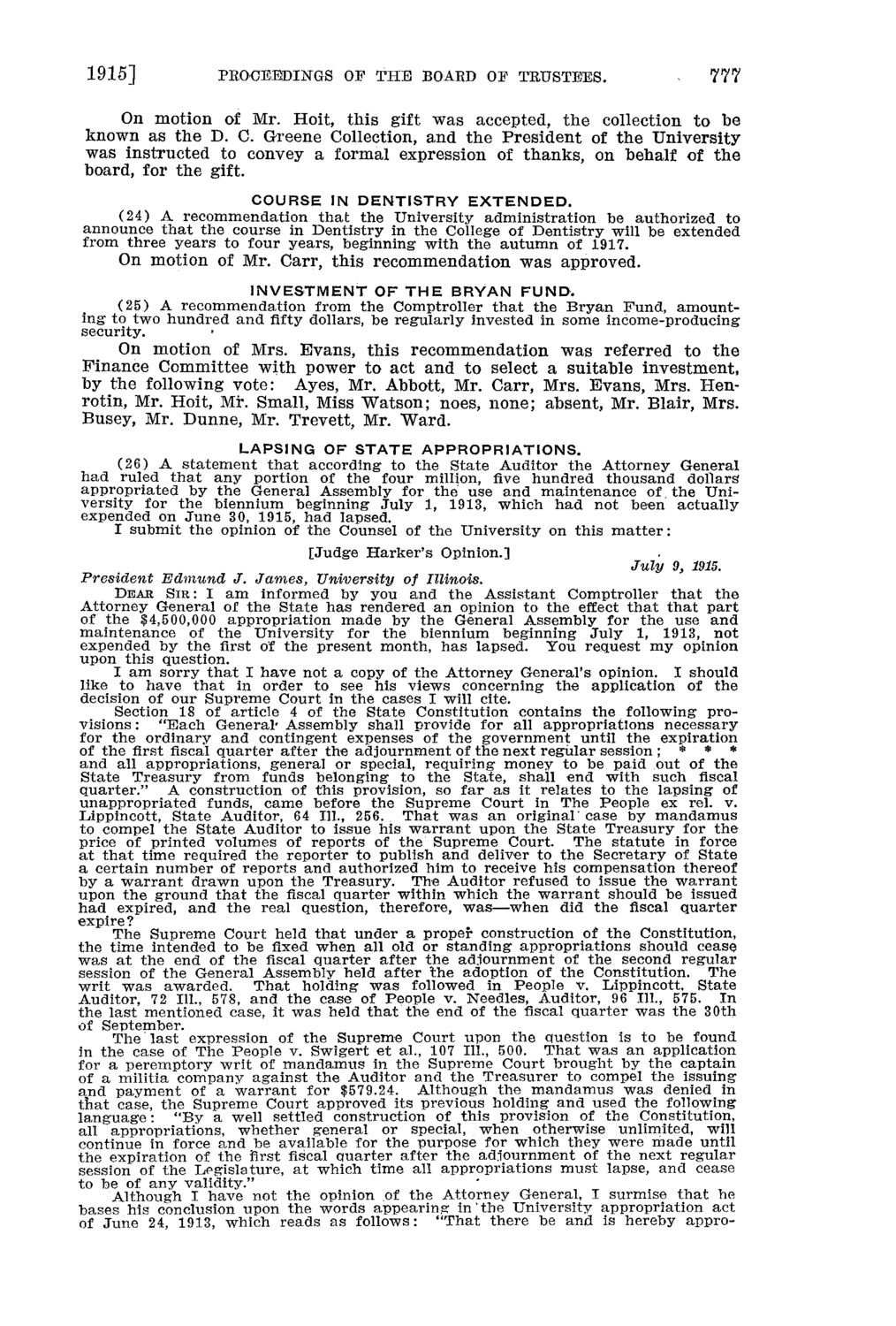| |
| |
Caption: Board of Trustees Minutes - 1916
This is a reduced-resolution page image for fast online browsing.

EXTRACTED TEXT FROM PAGE:
1915] PROCEEDINGS OF THE BOARD OF TRUSTEES. , 777 On motion of Mr. Hoit, this gift was accepted, the collection to be known as the D. C. Greene Collection, and the President of the University was instructed to convey a formal expression of thanks, on behalf of the board, for the gift. COURSE IN D E N T I S T R Y EXTENDED. (24) A recommendation that the University administration be authorized to announce that the course in Dentistry in the College of Dentistry will be extended from three years to four years, beginning with the autumn of 1917. On motion of Mr. Carr, this recommendation was approved. INVESTMENT OF THE BRYAN FUND. (25) A recommendation from the Comptroller that the Bryan Fund, amounting to two hundred and fifty dollars, be regularly invested in some income-producing security. On motion of Mrs. Evans, this recommendation was referred to the Finance Committee with power to act and to select a suitable investment, by the following vote: Ayes, Mr. Abbott, Mr. Carr, Mrs. Evans, Mrs. Henrotin, Mr. Hoit, Mr. Small, Miss Watson; noes, none; absent, Mr. Blair, Mrs. Busey, Mr. Dunne, Mr. Trevett, Mr. Ward. LAPSING OF S T A T E APPROPRIATIONS. (26) A statement that according to the State Auditor the Attorney General had ruled that any portion of the four million, five hundred thousand dollars appropriated by the General Assembly for the use and maintenance of, the University for the biennium beginning July 1, 1913, which had not been actually expended on June 30, 1915, had lapsed. I submit the opinion of the Counsel of the University on this matter: [Judge Harker's Opinion.] July 9, 1915. President Edmund J. James, University of Illinois. DEAR S I R : I am informed by you and the Assistant Comptroller that the Attorney General of the State has rendered an opinion to the effect that that part of the $4,500,000 appropriation made by the General Assembly for the use and maintenance of the University for the biennium beginning July 1, 1913, not expended by the first of the present month, has lapsed. You request my opinion upon this question. I am sorry that I have not a copy of the Attorney General's opinion. I should like to have that in order to see his views concerning the application of the decision of our Supreme Court in the cases I will cite. Section 18 of article 4 of the State Constitution contains the following provisions : "Each General' Assembly shall provide for all appropriations necessary for the ordinary and contingent expenses of the government until the expiration of the first fiscal quarter after the adjournment of the next regular session ; * * * and all appropriations, general or special, requiring money to be paid out of the State Treasury from funds belonging to the State, shall end with such fiscal quarter." A construction of this provision, so far as it relates to the lapsing of unappropriated funds, came before the Supreme Court in The People ex rel. v. Lippincott, State Auditor, 64 111., 256. That was an original" case by mandamus to compel the State Auditor to issue his warrant upon the State Treasury for the price of printed volumes of reports of the Supreme Court. The statute in force at that time required the reporter to publish and deliver to the Secretary of State a certain number of reports and authorized him to receive his compensation thereof by a warrant drawn upon the Treasury. The Auditor refused to issue the warrant upon the ground that the fiscal quarter within which the warrant should be issued had expired, and the real question, therefore, was—when did the fiscal quarter expire ? The Supreme Court held that under a proper construction of the Constitution, the time intended to be fixed when all old or standing appropriations should cease was at the end of the fiscal quarter after the adjournment of the second regular session of the General Assembly held after 'the adoption of the Constitution. The writ was awarded. That holding was followed in People v. Lippincott, State Auditor, 72 111., 578, and the case of People v. Needles, Auditor, 96 111., 575. In the last mentioned case, it was held that the end of the fiscal quarter was the 30th of September. The last expression of the Supreme Court upon the question is to be found in the case of The People v. Swigert et al., 107 111., 500. That was an application for a peremptory writ of mandamus in the Supreme Court brought by the captain of a militia company against the Auditor and the Treasurer to compel the issuing and payment of a warrant for $579.24. Although the mandamus was denied in that case, the Supreme Court approved its previous holding and used the following language: "By a well settled construction of this provision of the Constitution, all appropriations, whether general or special, when otherwise unlimited, will continue in force and be available for the purpose for which they were made until the expiration of the First fiscal quarter after the adjournment of the next regular session of the Legislature, at which time all appropriations must lapse, and cease to be of any validity." Although I have not the opinion of the Attorney General, I surmise that he bases his conclusion upon the words appearing in'the University appropriation act of June 24, 1913, which reads as follows: "That there be and is hereby appro-
| |